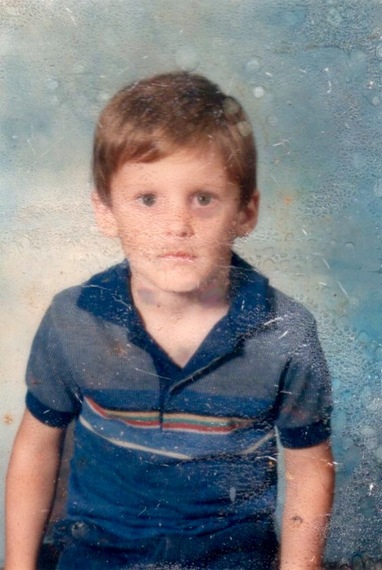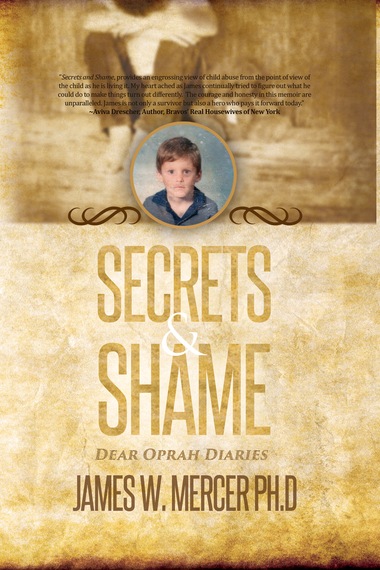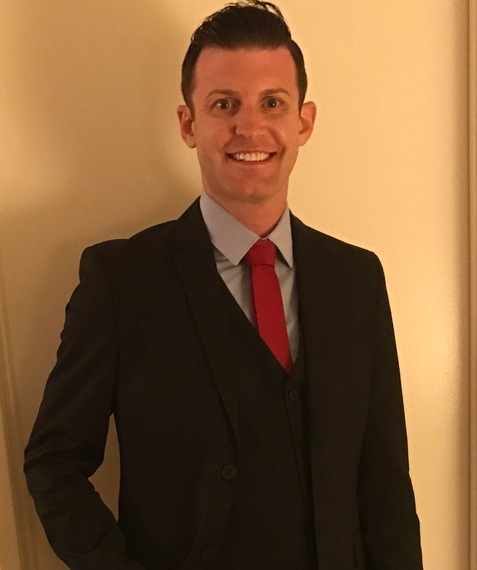Dr. James Mercer's story could have turned out very differently than it did. He was raised in a physically and emotionally abusive home. His father was a violent alcoholic who was an abusive father and husband. His mother was a hopeless codependent who continued to deny and dismiss how damaging her husband was and could be.
Dr. Mercer remembers at the young age of seven years old, he had a detailed plot to kill his father when he realized his mother would never leave the marriage. It's a powerful memory that would stay with him for life.

Mercer's desperate need to be loved and accepted for who he was, a gay, Jewish man, never got realized by his immediate family. Eventually, his overwhelming need to be loved and accepted would get him to turn to drugs and alcohol in an ill attempted way to sooth this devastating emotional pain.
But James Mercer had the looming memory of his destructive father, and he knew he didn't want to be like him. Somewhere deep inside of him, he knew he could do better. An eternal optimist who had a habit of looking for the happy ending in every situation, he found a way to turn his dark world around. Dr. Mercer's story is a testament to the resiliency of the human spirit against all odds. He's a man who becomes exceptional not in spite of, but because of his tragic personal history.
When you initially meet James Mercer, the first thing that stands out about him is his loving nature and extraordinary ability to connect with others. I had the opportunity to sit down with Dr. Mercer to learn more about his new memoir, Secrets and Shame, and to listen to how he used his past, very painful experience as a change agent for good.
Dr. Robi: Why do you write?
Dr. Mercer: When I was a young child, my aunt and uncle gave us their old black and white TV. Oprah told me on her show one afternoon to start writing in a journal every day. This daily exercise had a magical effect on me. The exercise grew into a habit that almost became an obsession. I credit this habit with helping me discharge the anger that resulted from my almost daily abuse both at home and at school. When I remember back to those entries, I can visualize the anger leaving me and landing on the written page, forever memorialized. I would often tell myself while ending an entry, now you won't ever forget....and because of those journals that subsequently gave birth to Secrets & Shame, I won't.
Dr. Robi: What got you to write this memoir at this time?
Dr. Mercer: I began by writing several papers in graduate school about my childhood experiences. I saved those papers. I have three dear sister-friends in their seventies who live in Dallas, Texas. They were listening tearfully to one of my papers one day and one by one they told me my story had to be told. They have a beloved adult gay family member who had helped them all understand what a gay person so often goes through growing up. Immediately after this encounter, actually writing the memoir started almost accidentally by just transcribing and deciphering the journal entries. The story began to write itself as I filled in the back story from memory and from excerpts from those papers from graduate school.
Dr. Robi: What were you hoping to accomplish with your book Secrets & Shame?
Dr. Mercer: I wish I could tell you I visualized a long range plan with stated goals before the project began, but it didn't happen that way. As the story began to unfold, however, goals started to come into focus both from the writings and from my daily interactions with foster children in my capacity as owner of LoneStar Social Services and LoneStar Fostering Connections, a nonprofit corporation. Every abused or sexually confused foster child became me as a child, and I developed a passion for making each child's life better than mine had been. I soon realized that from a portion of the proceeds from the book sales, we could buy a ranch and furnish a facility for foster kids waiting for a permanent home.
Dr. Robi: What was the hardest aspect of writing this memoir for you?
Dr. Mercer: Reliving the abuse and being reminded of incidences I had repressed was very painful. The other difficult unexpected occurrence for me was knowing that my mother would be hurt by the revelations from my perspective. I also knew her reality would be different because of her almost infantile attachment to, and dependence on, my dad. Also, she had spent so much of her time all through the years making excuses for him and always in and out of varying degrees of denial that the abuse of the two of us was even happening. We have basically agreed that we just experienced and remember those occurrences differently.
Dr. Robi: Where do your extraordinary loving nature and admirable sense of resilience come from?
Dr. Mercer: One of my favorite extensive term papers in graduate school was on the innate nature of happiness or melancholy, regarding the resiliency of children. I see resilience every day in even the youngest children. I have come to personally believe that those traits are at least partially determined by our DNA, a lot like eye and hair color. Fortunately, I believe those traits are gifts I was given, without regard to their origin. In other words, I've come to believe that it isn't anything that I've done, it may just be who I am.
Dr. Robi: Is your faith a part of your resiliency?
Dr. Mercer: Yes, without a doubt, but my evolving faith may actually be the product of my resiliency. From my earliest memories, my resiliency manifested itself in many ways. For instance, I wanted the ending to every story to be happy. No matter how sad any story was, I looked forward to the happy ending I rarely doubted would come. In the rare cases where I was beginning to doubt a happy ending, I would spring into action and do everything in my power to manipulate a happy ending to any given situation. One thing I remember that I did like about attending Sunday school in those early years was learning the concept that no matter how sad life might be present, there would be a happy ending after this life. I now realize that my attempts at suicide in my early and teen years were just attempts to rush a happy ending.
Also, looking back at my earliest memories, I now describe myself as a seeker. My mother's unwavering belief in an all-powerful God definitely had a profound influence on me. The problem I always had with her view of religion was the way the followers of the religion treated me. I now know that I did not only blame the perpetrators for their lack of love and tolerance toward me, but I also blamed G-d for allowing it. As an adult I now know that the free choice G-d gave us all makes us individually responsible for our actions. One of my early counselors and spiritual mentors taught me to visualize G-d crying at humans' inhumane treatment of each other. I still use that visualization to this day both in my personal and professional life.
Dr. Robi: What is your relationship like with your family now?
Dr. Mercer: I am sad to report that my greatest fears were realized. My mother was hurt and we have had very little contact with each other since the book was released. We have agreed that as long as my dad is alive, neither my dad nor my mom will allow us three to have a functional relationship. My dad views any person who takes my mom's attention as an interloper. My mom says my dad is her best friend and that is sadly true. He has fiercely isolated her from any other possible friend or relationship.
About six weeks before the release of the book my mom and dad were at my house and I heard her screaming. My dad had her by the neck, pushed up against the wall and I pulled him off of her, against her angry protestations. My mom railed against me for interfering. I had my partner take them home.
A few weeks later Mom called to say she was going to have to have all her teeth pulled because of the unbearable pain she was in. I was surprised because they were not visibly decaying. My partner took her to the dentist and the dentist said that every upper tooth was cracked beyond repair. The dentist asked if she had been in a bad accident that could have caused the damage. My partner told the dentist that he did not know of any such accident, not even thinking of the brutal treatment she had received from my dad for years. She had to have false teeth on the top.
My brother called a couple of months ago and said Mom was in the hospital. Her face was bruised, swollen, and bloody. The doctor called me, said he had read Secrets & Shame, and asked if someone (or my dad) could have done this to her. During the last month, she has once again been in the hospital under similar circumstances. I have had to distance myself from the situation.
Dr. Robi: Were you inspired by any authors that you admire?
Dr. Mercer: The Glass Castle by Jeannette Walls and Angela's Ashes by Frank McCourt helped me understand the universal phenomenon of suffering and to a large degree were a part of the catalysts that gave me the courage to risk writing my own story.
Current books I have recently read by authors Dr. Robi Ludwig, Aviva Drescher, and Ashley Rhodes-Courter, all of whom are endorsers of my book, gave me both courage and valuable insight as I worked on Secrets & Shame.
Dr. Robi: If you had to do it all over again, is there anything you would add or change in Secrets & Shame?
Dr. Mercer: There's a well-known line that a book is never finished -- you just find a good place to stop. That is so true. Every day I think of something I wish I had added, and there are several things I did add, I must admit, that give me slight pause when I think about them.
Dr. Robi: What can we expect from you in the future?
Dr. Mercer: The first chapter of my next book, Matters of Life After Death, is in the back of Secrets & Shame. It is an expose' of the funeral business that helped feed my family while I was getting my degrees. There is not a release date as of yet.
Dr. Robi: Where can people find out more about you, your book tour and your book?
Dr. Mercer:
World Wide Web: www.drjamesmercer.com
Twitter: @secretsandshame
Instagram: www.instagram.com/james_mercer_phd/


